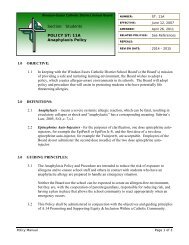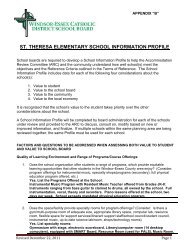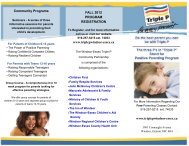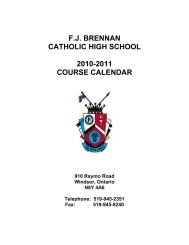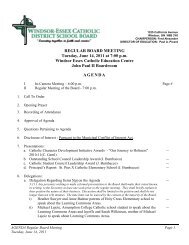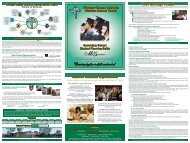Guide for Hosts
Guide for Hosts
Guide for Hosts
Create successful ePaper yourself
Turn your PDF publications into a flip-book with our unique Google optimized e-Paper software.
leave them to find food themselves, they may wait<br />
to be offered something every time.<br />
“Com<strong>for</strong>t foods” can go a long way <strong>for</strong> world<br />
travelers! You might want to buy your student<br />
something familiar from home from time to time. If<br />
you’re feeling adventurous, you might consider<br />
asking your student to dinner at a restaurant<br />
serving cuisine from their country. This can be a<br />
fun evening of role-reversal: you can be the visitor<br />
and they can be the guide.<br />
Conversation<br />
Not surprisingly, students are often apprehensive<br />
and insecure about expressing themselves in<br />
English. Please be patient, and ready <strong>for</strong><br />
misunderstandings!<br />
Our students have come to Canada precisely to<br />
become more confident and assertive in English,<br />
and they need (and expect) to be able to practice<br />
what they learn at school at home, with their hosts.<br />
Using English Day-to-Day<br />
You may find it helpful to include the student/s in<br />
as many simple daily activities as possible, such as:<br />
• conversation, especially at dinner;<br />
• setting the table, meal preparation, gathering,<br />
etc.;<br />
• accompanying you on errands (a trip to the<br />
grocery store is an interesting event <strong>for</strong> many<br />
students and helps you to discover their favourite<br />
foods);<br />
• inviting your student to join you when exercising;<br />
• watching TV programs that stimulate<br />
conversation or sharing of ideas.<br />
Keeping Language Practice Fresh<br />
It is also helpful to encourage situations that will<br />
include other members of the household, such as:<br />
• share your family photo albums/videos<br />
• play cards/board games (ask them to teach you<br />
one)<br />
• help students to plan their outings<br />
• have a picnic with your student, instead of<br />
staying in<br />
• plan activities together and mark them on the<br />
calendar: students like to know their family plans<br />
to do things with them, and this method helps<br />
ensure everyone is interested in the activity.<br />
Techniques <strong>for</strong> Mutual Understanding<br />
There are a few simple techniques to employ and<br />
traps to avoid in facilitating communication with<br />
your student:<br />
• Encourage your students to talk about<br />
themselves with open-ended questions like “What<br />
sports do you enjoy?” or “Tell me about your<br />
family.” Avoid yes/no questions.<br />
• Avoid negative questions such as, “You don’t like<br />
watching movies?” or “Didn’t you like the lasagna?”<br />
• Avoid asking, “Do you understand?” Students will<br />
ordinarily answer, “Yes” <strong>for</strong> the sake of harmony!<br />
Instead, ask the student to tell you what they think<br />
you are saying — as a test <strong>for</strong> you, not <strong>for</strong> them!<br />
Begin by asking <strong>for</strong> help, saying, “Help me please;<br />
tell me what you think I said.”<br />
• Separate your words.<br />
• Speak English at all times;<br />
• Use idioms and slang, but explain them. Your<br />
student will have their fill of grammar lessons at<br />
school. They will often look to their host family to<br />
learn how Canadians “really” speak.<br />
• Speak slower, not louder, if your student doesn’t<br />
understand. You can also try rephrasing the same<br />
ideas using different words;<br />
• Use charades, pointing and body language!<br />
• Write items down <strong>for</strong> the student—often their<br />
reading skills are better than their listening skills;<br />
• Use Google to translate a word or phrase.<br />
• Above all: smiles, laughter and genuine warmth<br />
are known and understood in all cultures. You may<br />
be surprised at how far these expressions will go in<br />
avoiding and easing misunderstandings.<br />
• If all else fails, please call CHI <strong>for</strong> assistance! We<br />
have interpreters available and can arrange to get<br />
our students extra help at school.<br />
© 2011 CHI/CANADA HOMESTAY INTERNATIONAL 5



